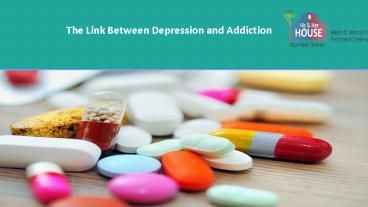Depression and addiction are two commonly co-occurring mental health disorders that often go hand in hand. While each condition can exist independently, they frequently arise together, creating a complex and challenging situation for those affected. In this article, we will explore the connection between depression and addiction, how they influence each other, and strategies for managing both conditions simultaneously.
Understanding Depression:
Depression is a mood disorder characterized by persistent feelings of sadness, hopelessness, and loss of interest in activities that were once enjoyed. It can impact a person’s ability to function in daily life and disrupt their relationships, work, and overall well-being. Depression is often linked to a chemical imbalance in the brain, as well as environmental and genetic factors.
Understanding Addiction:
Addiction is a chronic brain disease that involves compulsive drug seeking and use, despite harmful consequences. It is often fueled by a powerful craving for the substance or behavior, and individuals with addiction may struggle to control their impulses. Addiction can involve substances such as drugs and alcohol, as well as behaviors like gambling or internet use.
The Connection Between Depression and Addiction:
Research has shown a strong link between depression and addiction, with one condition often exacerbating the other. Individuals with depression may turn to drugs or alcohol as a way to self-medicate and cope with their symptoms. Conversely, substance abuse can also lead to or worsen feelings of depression, creating a vicious cycle of dependence and despair.
How Depression Can Lead to Addiction:
People who are struggling with depression may seek relief from their emotional pain through substance use. Alcohol and drugs can temporarily numb feelings of sadness and anxiety, providing a temporary escape from the overwhelming weight of depression. Unfortunately, this self-medication can quickly spiral into addiction, as individuals develop a tolerance to the substance and require more to achieve the same effect.
How Addiction Can Worsen Depression:
On the other hand, addiction can also contribute to the development or intensification of depressive symptoms. Substance abuse can disrupt the brain’s natural chemistry, leading to imbalances in neurotransmitters that regulate mood. Additionally, the consequences of addiction, such as financial troubles, relationship problems, and legal issues, can further exacerbate feelings of hopelessness and despair.
Integrated Treatment Approaches:
Given the complex interplay between depression and addiction, it is essential to address both conditions simultaneously in treatment. Integrated approaches that focus on treating the individual as a whole, rather than separate disorders, have been shown to be the most effective. This may involve therapy, medication, support groups, and lifestyle changes to promote overall mental health and well-being.
Coping Strategies for Dual Diagnosis:
Managing both depression and addiction can be challenging, but there are strategies that can help individuals navigate this difficult journey. Some coping mechanisms include mindfulness meditation, exercise, healthy eating, and engaging in activities that bring joy and purpose. Building a strong support network of friends, family, and healthcare professionals is also crucial in maintaining recovery.
Conclusion:
Depression and addiction are complex and intertwined mental health disorders that require a holistic approach to treatment. By understanding the connection between these conditions and implementing integrated strategies for recovery, individuals can take steps towards healing and reclaiming their lives. Remember that help is available, and you are not alone in your struggle. Reach out for support and take the first step towards a brighter future.
Remember to seek professional help if you or someone you know is struggling with depression and addiction.
